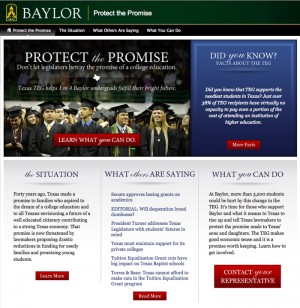By Sara Tirrito
Staff Writer
The possibility of severe Texas Equalization Grant cuts has caused leaders of colleges and universities across the state to speak out on behalf of the financial aid program. Today, President Ken Starr will send an email to members of the Baylor family, calling them to support the TEG program and contact their state legislators to express concerns about the proposed cuts to the program.
The email will be sent to current students, faculty and staff, and also parents, alumni and friends of the university who reside in Texas.
The university also launched a website, baylor.edu/saveteg, on Monday to provide the Baylor family with information and resources to use in contacting their representatives and seniors.
“When an issue affects students, our alumni care,” Tommye Lou Davis, vice president for constituent engagement, said. “So it is time to arm them with the facts and turn them loose.”
TEG cuts, proposed at 41.5 percent, could affect thousands of students not only statewide, but at Baylor itself. This year, the university has 3,200 students receiving funds through the TEG. More than half of those students are minorities.
However, many still have hope that the fate of the TEG can be reversed. Rochonda Farmer-Neal, director of governmental relations for Baylor, said she believes members of the Baylor family can truly make a difference regarding the TEG.
“If they contact their representatives and express to them the importance of TEG, it will have a major impact on the outcome of TEG,” Farmer-Neal said.
“When legislative members hear from constituents, they listen to them. They want to know what is impacting them, so for our alumni, our students to contact them it will have a major impact. And I believe it will be a positive impact on TEG.”
Baylor student ambassador and Mountain View, Okla., senior Aaron Fobes took a trip to the state capital with other Baylor ambassadors to lobby for the TEG on Thursday. Fobes said with a quarter of the university’s students receiving TEG aid, it is important for all students to realize how cuts to the grant could affect the student body as a whole.
“I think it’s important that students realize that with 25 percent of our student body receiving this grant, the reduction is really going to affect the type of students we have,” Fobes said. “I think the purpose of a university is a very collective experience that’s shared not only by academic merit but by people with different socioeconomic backgrounds bringing a different perspective, and that’s what is important about this grant is that it increases the diversity at our university.”
TEG cuts could affect not only Baylor’s diversity, but could also hinder current students from attending the university next year.
“Dramatic cuts in TEG funding could change the profile of the freshman class and it could affect retention, because students that are presently on the TEG might not able to return without this financial aid,” Davis said.
Jackie Diaz, assistant vice president for student financial services, said a lack of TEG funding could also cause the state to lose out on talented future employees.
“Some of our students really want to go to Baylor. They want the private school experience,” Diaz said, “and if they go outside the state because the funding is not available sufficient to meet their needs here in the state, then Texas [has] that risk of losing that student in the future and some of our brightest students could be finding employment in other places.”
Uncertainty about TEG funding has already affected the university, leading the financial aid office to alter award letters this year. TEG monies were left off completely and a paragraph that informed families they would be contacted if state funding for them was added.
“We sent out award letters this year without that TEG amount listed on the award for our prospective freshmen and transfer students, and that’s a first since we started TEG to my knowledge,” Diaz said.
Knowing that many families have come to expect TEG funding but also want realistic estimates prompted the financial aid office to address the situation when the letters were sent.
“Obviously, the award goes out every year and could change every year, but I will say that some of our parents … have a reasonable expectation of what that TEG amount may be because of previous experiences with financial aid and the awarding environment,” Diaz said, “so I think that’s why we wanted to address that expectation and help them make the best decision possible, given that we just don’t have all of the facts yet.”
Although the financial aid office does not expect final news on the TEG until June, students were still encouraged to decide whether they would enroll by May 1 so they could get a refund on their deposit, if needed.
“I certainly expect that it’s going to cause some students to decide not to attend Baylor,” Diaz said. “I think probably there will be others that will look for other financial options to try to replace the funds that they had hoped to receive with the TEG.”







